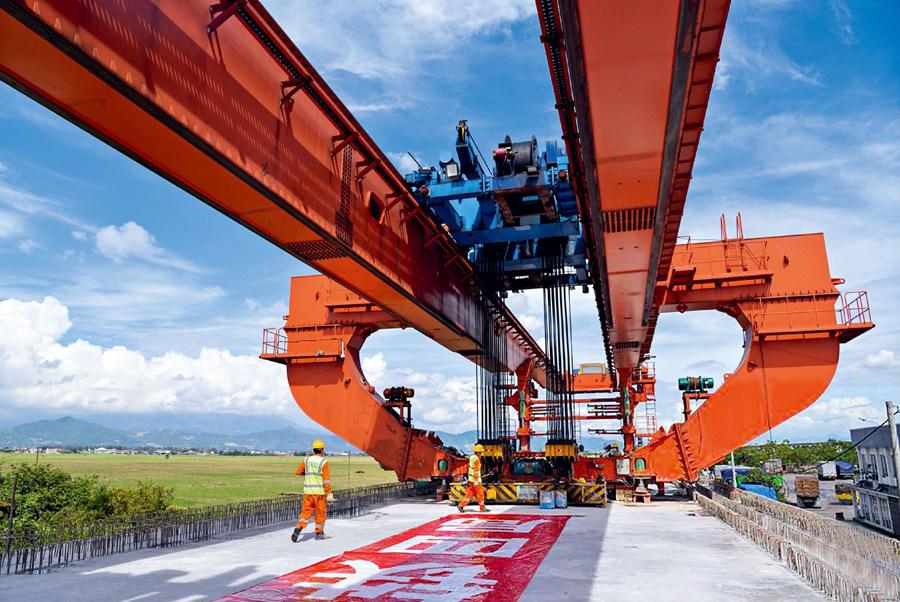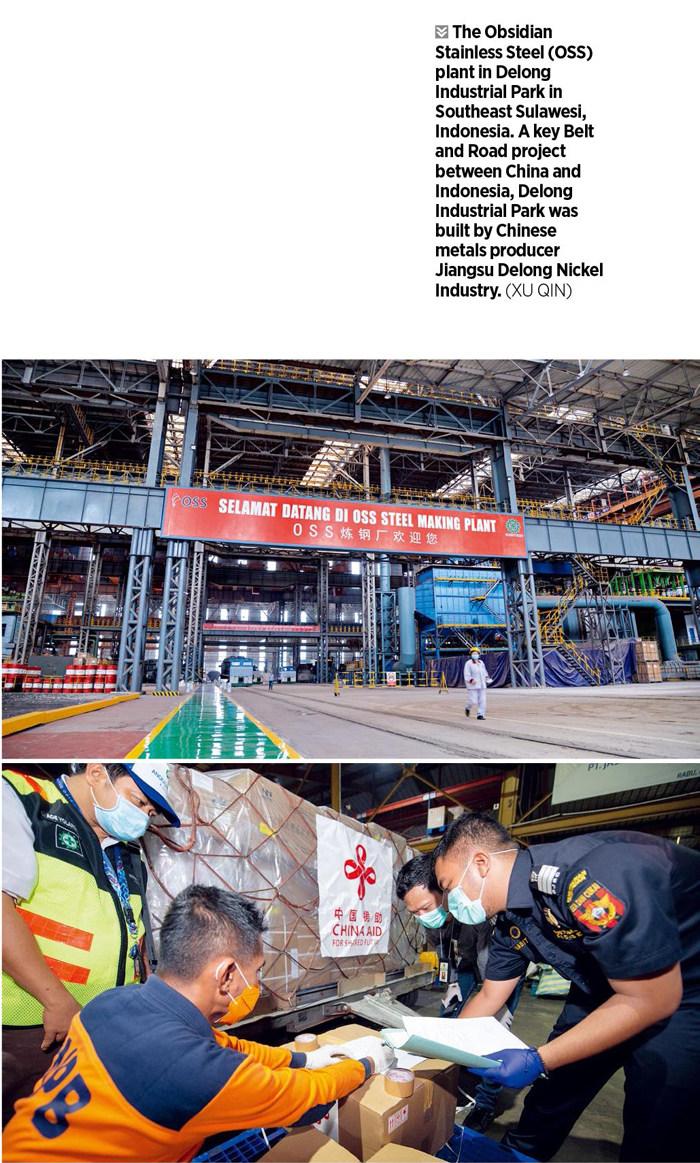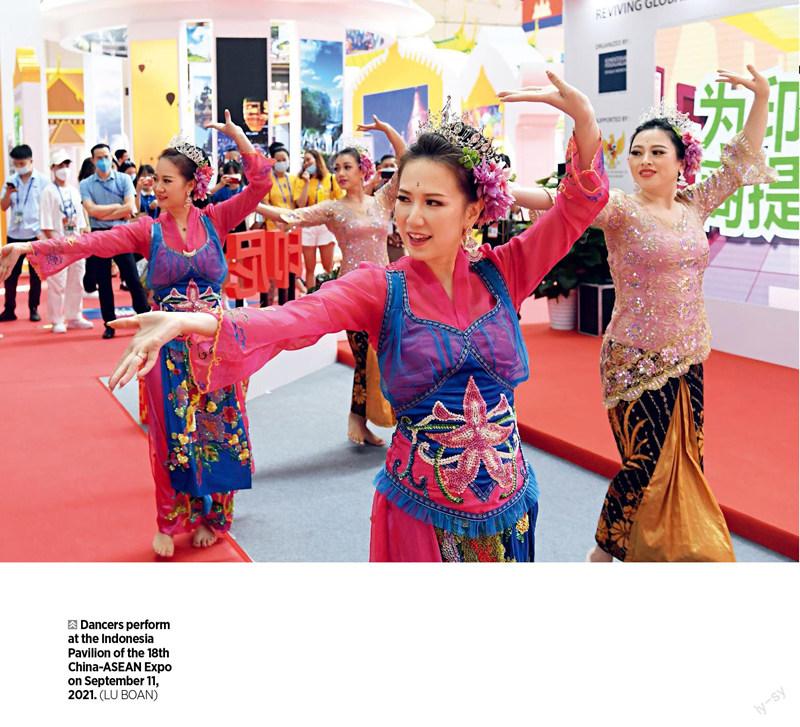GOLDEN OPPORTUNITY FOR CHINA-INDONESIA COOPERATION
2022-05-30LuoChuanyu
Luo Chuanyu



No.4 girder field of the Jakarta-Bandung High-Speed Railway in Bandung, Indonesia, May 25, 2022.(XU QIN)
Indonesian PresidentJoko Widodo accepted an invitation from ChinesePresident Xi Jinping and visited China from July 25 to 26. Widodo was thefirst head of state to visit China since the BeijingWinter Olympics inFebruary this year, andChina was the first stopofWidodos East Asia tour, which evidences how much importance both China and India placed on the visit as well as the bilateralrelationship. Indonesian mediaand academics called the visit a “golden opportunity”for China- Indonesia cooperation.
International and Domestic Pressure
The Widodo government is currently grappling with both international and domestic pressure.
The Russia-Ukraine conflict ratcheted up the wrestling between great powers. As the chair of this years G20, Indonesia adopted the position of “not taking sides” in direct conflicts. Widodo stressed that the G20 was established as an economic platform to focus on coordination of macroeconomic policies, and that it is not a political arena for countries to deal with geopolitical issues and conflicts. Unfortunately, the United States and some European countries are diminishing G20s economic significance to use the occasion to debate political issues.
At the G20 Finance Ministers and Central Bank Governors Meeting in Washington D.C. in April, participating finance ministers continued arguments over the Russia-Ukraine conflict, forcing Indonesia, which took over the G20s rotating presidency this year, to give up the final jointstatement.
Disputes became even moretense at the G20 Foreign Ministers Meeting in July when the foreignministers of the G7 membersunited to boycott Russia. Toexpress dissatisfaction with Russia attending the meeting, they allstayed away from the dinner andrefused to take the traditionalgroup photo together. Because ofthe stalemate, many importantissues scheduled for discussion,including the global economy andfood crisis, were set aside. Themeeting ended with no substantialjoint declaration either.
In this tense situation, Chinassupport will be essential forWidodo to hold a successful G20LeadersSummit in November andachieve the goals on the meetings agenda. Indonesia needs China to coordinate and mediate disputes among participating countries and prevent any ASEAN country from “taking side” at the summit.
Meanwhile, Indonesia isalso seeing mounting domestic pressure. Like many othercountries, its inflation rate issurging because of the soaringprices of food and energy.
According to statistics from Indonesias Central Bureau of Statistics, the annual inflation rate reached a record 4.35 percent this June, the highest since 2019.
Indonesia has been doing better at controlling inflation than many countries like the US and the UK. In 2020, it rolled out a nationalprogram to recover the domesticeconomy which successfullymaintained the purchasingpower of low-and middle-income families. However, the continuing price increase of life necessitiesincluding cooking oil, eggs, beef,sugar, and beans is straining manyhouseholds in the country with a population of 275 million people.
Indonesia has also been struckby the recent outbreak of Foot and Mouth Disease (FMD) as well asfrequent floods and an extendeddry season that has affecteddomestic agricultural productionand harvests. These disastersadded even more pressure toinflation.
Although Widodosgovernment stepped up fiscalallocation to provide greatersubsidiaries to affected industriesand people, the constantlychanging prices of raw materialsundermined the governmentsefforts. However, Indonesia didsee a spike in income recentlybecause the prices of its majorexports such as coal, nickel, andpalm oil increased, but the country is facing the dilemma of flaggingsupply capacity and purchasingpower, both of which wouldthreaten Indonesias national andsocial security in the long term.
Therefore, it is essentialfor Widodo, a pragmatic stateleader focusing on economicdevelopment, to prioritizeeconomic and trade cooperationwith China, its biggest tradingpartner, at the top of his diplomatic strategies. Before Widodos visit,Indonesian Foreign MinisterRetno L. P. Marsudi made it clearthat the focus of talks betweenthe heads of the two countrieswould be“enhancing economiccooperation, particularly on tradeand investment.”
Fruitful Meeting
China was enthusiastic about Widodos visit, and both sidesheld multiple high-level talksand released a joint statement on enhancing cooperation.
First, China and Indonesiawill strengthen cooperationunder bilateral and multilateral frameworks.
To boost bilateral cooperation,both sides further interpreted theChina-Indonesia Comprehensive Strategic Partnership, highlighting duties related to securing theinterests of emerging marketeconomies and developingcountries. The two sides agreed to strive to build a China-Indonesiacommunity with a shared future, forging an exemplary model ofSouth-South cooperation formutual benefits, win-win results, and common development.
On multilateral collaboration,both sides stressed each otherssignificance in regional andinternational affairs. Chinareaffirmed its support forASEAN centrality in the regionalarchitecture to facilitate regionaleconomic recovery. China andIndonesia support each other invarious fields to produce mutualbenefits, practice multilateralism, and contribute to boosting worldeconomic rejuvenation anddevelopment and improvingglobal economic governance.
China and Indonesia agreedto expand economic and tradecooperation. Both sides signeda cooperation document onexporting Indonesian pineapples to China. China expressedintentions to import morepalm oil and other high-qualityIndonesian produce to scale upbilateral trade and balance tradewhile promoting high-qualitydevelopment. The two countriesalso upgraded existing cooperation projects and achievements.
Widodo said that Indonesiastands ready to work with China to ensure that the Jakarta-Bandunghigh-speed railway is completedand begins operation on scheduleand becomes another milestonein bilateral friendship. Newflagship cooperation projects such as the Regional ComprehensiveEconomic Corridor and the“TwoCountries, Twin Parks”will helpexpand bilateral cooperation andthe development of Indonesiasnew capital.
It should also be noted that both sides are seeking to materializebenchmark projects to implement the Global Development Initiative (GDI) and focus on issuesconcerning developing countries. Cooperation would cover povertyalleviation, green development,the digital economy, and areasrelated to living standards. Chinaand Indonesia are assumingbig responsibilities as leading developing countries.
Both sides elaborated on cooperation on people-topeople exchanges. Based on the solid foundation and successful experience of jointly fighting COVID-19, the two countries will continue cooperation throughout the vaccine industrial chain and on drug research and development. China pledged to help Indonesia build a regional vaccine production center.
Both countries agreed to accelerate resumption of peopleto-people exchanges. Young people are important participants of people-to-people diplomacy and play a positive role in facilitating national development and international cooperation. Local governments, as the executors of relevant policies, can play a supplementary role in facilitating cooperation between central governments.
China and Indonesia also agreed to expand maritime cooperation. Collaboration on maritime affairs is not only key to synergy between Chinas Belt and Road Initiative and Indonesias Global Maritime Fulcrum, but also a new highlight of the bilateral relationship shifting to four-pillar cooperation covering politics, economics, people-to-people exchange, and maritime projects.
The joint statement evidenced the two countries focus on pragmatic cooperation to further implement the strategies and consensus of the two presidents. The channels for strategic synergy will certainly include maritime departments. On July 22, He Lifeng, chairman of the National Development and Reform Commission of China (NDRC), held a video meeting with LuhutPandjaitan, Coordinating Minister for Maritime Affairs and Investment and official in charge of Indonesia-China cooperation, to promote synergy between the Belt and Road Initiative and the Global Maritime Fulcrum. Cooperation has targeted Indonesias specific needs such as fishery cooperation represented by the National Fish Barn project.
While the world is still suffering from the COVID-19 pandemic and the crisis in global supply chains, Widodos visit to China will give Indonesia a sharper edge to complete recovery of its national economy.
Golden Opportunity for Global Governance
Widodos visit also brought golden opportunities to China.
During his stay, China reachedconsensus with Indonesia ondevelopment issues and pledged to work with Indonesia onconcrete measures to implement the GDI by aligning Chinasrelevant initiatives with theASEAN Outlook on the Indo-Pacific while expanding regionalcooperation.
Chinas invitation also showedthe world how it welcomesforeign friends and that thecountry has opened the door tovisiting heads of state. Rather than being intimidated by the COVID-19 pandemic, China has kept aclose eye on global and regionaldevelopment as it has assumedresponsibility as a major countrycommitted to promoting globalgovernance.
Widodos visit also bringsgolden opportunities to East Asiaand the Pacific Region as well.This year, Cambodia is the rotating chair ofASEAN and relatedSummits, Thailand will host theAPEC Economic LeadersMeeting,Indonesia will host the G20LeadersSummit, and China willhost the BRICS Leaders Meeting.
Asias time has come in global governance. In May, Cambodia,Indonesia, and Thailand issueda joint press release to call forAsian solidarity in response tovarious challenges. The threecountries declared that Asiancountries should play a positive role in maintaining regional and global peace and stability in the face of a turbulent international landscape. The meetingbetween Chinese PresidentXi Jinping and IndonesianPresident Joko Widodolaid a solid foundation forstrengthening multilateralism and provided strong supportfor ASEAN centrality inregional architecture, ongoing implementation of the Beltand Road Initiative, and wider development of the ASEANOutlook on the Indo-Pacific.
